Summary: The World Health Organization has granted Cepheid’s Xpert Mpox test Emergency Use Listing (EUL), enabling rapid, point-of-care mpox detection to support global outbreak management and aid underserved regions.
Takeaways:
- Cepheid’s Xpert Mpox test, now WHO-approved under the Emergency Use Listing, provides results in under 40 minutes and operates on the widely available GeneXpert platform, making it accessible in decentralized and near-patient settings.
- The Xpert Mpox test is crucial for distinguishing mpox from other similar-looking infections, supporting accurate and timely diagnosis in regions with limited testing infrastructure.
- In 2024, over 40,000 suspected mpox cases have been reported globally, underscoring the need for effective diagnostics like Xpert Mpox, particularly in low- and middle-income countries where testing capacity is limited.
Cepheid announced that The World Health Organization (WHO) has listed Xpert Mpox under its Emergency Use Listing (EUL) procedure.
The EUL process assesses the quality, safety, and performance of essential health products, such as diagnostic tests, to guide procurement agencies and WHO Member States in making informed decisions for time-limited emergency procurement.
About the Xpert Mpox Test
In February 2023, Xpert Mpox was the first point-of-care test to receive Emergency Use Authorization (EUA) from the U.S. Food & Drug Administration for the detection and/or diagnosis of mpox infection. Polymerase Chain Reaction (PCR) testing, which detects viral DNA, is considered the gold standard for diagnosing mpox infection1. Xpert Mpox on the GeneXpert Systems provides results for mpox clade II and for non-variola Orthopoxviruses (including mpox clade I and II) from lesion swabs. Results are available in less than 40 minutes, and the test can be performed in decentralized near-patient settings.
Further reading: Diagnostic Testing Should be at the Frontline of Mpox Battle
Global Impact of Mpox
In 2024, 18 countries have reported over 40,000 suspected mpox cases with most remaining unconfirmed due to limited testing capacity, especially in low and middle-income countries. In the Democratic Republic of the Congo—the hardest-hit country—testing has significantly increased in 2024, following efforts to decentralize testing with support from WHO and partners1.
One of the key signs of mpox infection is fever with development of a maculopapular rash, often appearing as small, raised spots. However, there are many other illnesses, such as chickenpox, measles, bacterial skin infections, syphilis, herpes, and medication-associated allergies that can present with similar symptoms. The World Health Organization recommends that suspected cases of mpox be confirmed with a PCR test run on an appropriate human lesion sample1.
“Xpert Mpox is the only point-of-care molecular test with WHO Emergency Use Listing (EUL), making it a valuable preparedness and response tool that can be deployed quickly where accurate and actionable information is needed,” says Vitor Rocha, president of Cepheid. “Xpert Mpox runs on Cepheid’s GeneXpert systems, which have the largest installed base of any molecular diagnostic platform.”
References:





